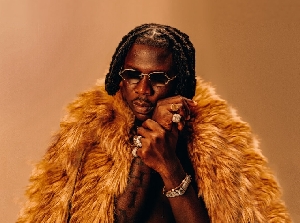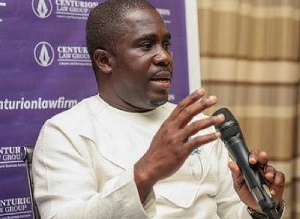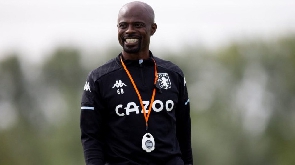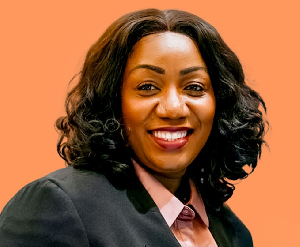By Kwame Okoampa-Ahoofe, Jr., Ph.D.
Among the Akan, there is a maxim which says that inasmuch as one may dislike the duiker, or antelope, one ought to honestly admit the fact that this species of quadruped has a graceful gait. The original author of this maxim likely had the most ardent political opponents of the Presidential Candidate of the New Patriotic Party (NPP) for Election 2012 in mind.
Writing under the querulous caption of “Where is Akufo-Addo’s Policy Statement?” one writer with whom I have had a couple of occasions to cross swords, as it were, demonstrated his abject lack of both scholarship and basic appreciation of what he cavalierly presumed to canvass. For starters, rather than read a full-length copy of the speech, the critic decided to take the hardly instructive shortcut of reading the largely filtered and summarized report of the same by Mr. Nathan Gadugah of JoyOnline.com. Needless to say, while the latter reporter is easily one of the best Ghanaian print journalists, Mr. Gadugah’s report does not amply detail the quite elaborate contents of Akufo-Addo’s policy statement to enable the notoriously vitriolic critic to appropriate it as a discursive anchor. No wonder the critic sounded far emptier than the speech that he morbidly sought to portray as such.
Personally, I had a little question mark against the rather unwieldy captioning of the speech, the first in a series of what the Danquah Institute operatives have dubbed the “Liberty Lectures.” I also have some qualms with a historiographical periodization which attempts rather rascally and, perhaps even opportunistically, to mark the beginning of modern Ghana’s anti-colonial liberation struggle from the standpoint of the significantly localized foundation of the admittedly historic Aborigines’ Rights Protection Society in 1897. Even more significantly must be observed the fact that nearly a quarter-century before, in 1874, Mr. George Kuntu Blankson, the Elder, had been seated in the Gold Coast Colony’s Legislative Council, the first African to do so. What is more, in 1897, Britain’s collaborative conquest of the Asante Federation lay nearly four years into the future. And, needless to say, it had taken that long because the Asantes, whose King Prempeh I had been exiled, first to Sierra Leone and finally to the Seychelles, had been fiercely defending their inalienable right to liberty when most of their other Akan brethren had acceded to the 1844 “Bondage.”
What is also significant to observe is that while, indeed, Mr. Ephraim Casely-Hayford, the first African philosopher-novelist of the twentieth century, had joined forces with Mr. John Mensah Sarbah to fiercely fight against Britain’s usurpation of Ghana’s lands and forestry resources, and thus could be aptly described as the first Ghanaian nationalists, nonetheless, as the leader of the National Congress of British West Africa (NCBWA), Casely-Hayford had actually fought for an Anglophone West African Commonwealth within the British Empire! He would, of course, later recognize the proverbial handwriting on the wall by, allegedly, knighting the young Dr. J. B. Danquah as the most suitable candidate to spearhead Ghana’s national liberation struggle within the broader setting of the so-called British West Africa. It would be the more circumstantially pragmatic Dr. Danquah who would initiate what may be properly termed as “African Nationalism.”
In other words, if in initiating its so-called Liberty Lectures the Danquah Institute operatives presume themselves to be strategically angling for the Fante vote, the latter, in of itself, may not be such a bad idea, after all, except for the fact that it does not do full justice to the real historical trend of events. A far more realistic perspective would begin with the restoration of the Asante Federation by the British colonial government in 1935, which actually galvanized our collective independence struggle psychologically. As already and indubitably noted by “The Liberty Lecturer” himself, the deadly anopheles mosquito, as well as the generally sultry climatic conditions of the erstwhile Gold Coast, had far more to do with the abandonment of Britain’s statutory attempt to summarily expropriate indigenous lands in the manner that the process was to assume in eastern and southern Africa, rather than merely a bevy of some fine mulatto – both genetically and culturally – gentlemen crafting deft protestations to the same.
Anyway, those loudly claiming that the Akufo-Addo speech lacks a coherent policy content had better lay their hands on an un-redacted copy of the original. And the mere fact that it sounded déjà-vu does not make it any less of a policy statement. About the only thing conspicuously lacking were statistical data vis-à-vis a ballpark figure regarding how much it would cost to provide free education to Ghanaian youths from Pre-K through Grade 12 or Senior High School. And also funding sources which an Akufo-Addo administration intends to tap in order to successfully execute such an agenda, as well as the long-term cost to the nation if such policy is defaulted upon. Objectively speaking, the NPP Presidential Candidate provided an ample bit of the latter in terms of the need for Ghana’s younger generation to be able to effectively compete on the increasingly hi-tech global market.
Then also in terms of industrial policy, the New Patriotic Party’s Presidential Candidate woefully failed to articulate precisely how he intended to organically modernize the automotive cottage industries that are the world-renowned Suame Magazine and Abossey Okai, for ready examples. Not much was also detailed about national security, as Nana Akufo-Addo had done in the past, particularly questions bordering on community policing and the modernization of the Ghana Armed Forces, beyond the “stitches” approach adopted by the Mills-led National Democratic Congress (NDC).
At any rate, those who accuse Akufo-Addo of simply rehashing the policy agenda of former President J. A. Kufuor, ought to educate themselves about the intricate dynamics of ideological camps and tenets.
On the whole, the speech was a good first draft. For instance, the title of Akufo-Addo’s presentation could have been made more readable, such as “Creating Opportunities for Prosperity in Ghana” or “Ghanaians in Pursuit of Prosperity,” an obvious echo of its American proto-creed of building a nation and a society in which “Life, Liberty and the Pursuit of Happiness” are foremost aspirations.
One thing is also delectably clear: New Patriotic Party speech writers have fizz, where their National Democratic Congress counterparts only have pluff!
*Kwame Okoampa-Ahoofe, Jr., Ph.D., is Associate Professor of English, Journalism and Creative Writing at Nassau Community College of the State University of New York, Garden City. He is Director of The Sintim-Aboagye Center for Politics and Culture and author of 22 books, including “Sounds of Sirens” (iUniverse.com, 2004). E-mail: okoampaahoofe@optimum.net. ###
Opinions of Sunday, 11 September 2011
Columnist: Okoampa-Ahoofe, Kwame
Akufo-Addo’s Policy Statement: A Critical Review – Part 1
Entertainment

















